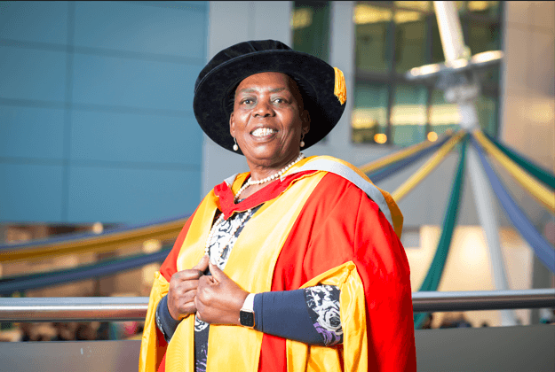Former South African politician and peace campaigner honoured
Nozizwe Madlala-Routledge has received an honorary doctorate from the University of Bradford.

“Expect the unexpected.”
That’s the advice peace activist Nozizwe Madlala-Routledge gave graduating students at the University of Bradford yesterday (Tuesday 3 December 2024).
Certainly, she believes her own journey has been unexpected, having gone from being a medical laboratory technologist to South Africa’s first female Deputy Defence Minister and leading the fight against AIDS.
“I did not expect to be a member of parliament,” she said. “Nor did I even dream of becoming a Deputy Defence Minister. In fact, when I got the call from the Secretary General of the African National Congress asking me to accept the role, I told him he had made a mistake.”
Yesterday, as Nozizwe was recognised as an Honorary Doctor of the University for her outstanding contribution to peace and social justice, there was no mistaking her contribution to society.
Having been one of the leaders in the fight to end Apartheid, Nozizwe clearly remembers watching Nelson Mandela leave prison after 27 years in 1990. Four years later, she became a member of parliament in Mandela’s government in a free South Africa.
In her speech at the University, Nozizwe paid tribute to civil rights activists who had inspired her, including Mandela along with Steve Biko, her mentor when she joined his South African Students Organisation while studying at medical school.
She said: “My journey of political awareness began in high school where my teachers urged us to open our eyes and act against the injustices around us. They introduced us to youth leaders like Steve Biko, who taught us to be active agents in our own liberation.”
Across campus from where Nozizwe delivered her speech in the University’s Great Hall stands the Biko room, situated in Student Central and named after the inspirational leader.
It’s not the only connection Nozizwe has with the University.
Earlier this year, she visited to deliver the annual Adam Curle Peace Lecture, organised as part of the 50th anniversary celebrations of the University’s Peace Studies department, which was founded by Curle, together with a group of northern Quakers.
Two of the University’s Rotary Peace Fellows have carried out Applied Fieldwork Experience at the Quaker United Nations Office in Geneva, Switzerland, when Nozizwe was Director, while two other peace studies students have had internships there.
Nozizwe said: “Peace studies is necessary for us to understand conflict and how to transform it. It excites me to see scientific knowledge being developed and used for the greater common good.”
She jokes that, as a radical pacifist with no military background, she was, perhaps, an odd choice to become Deputy Minister of Defence in South Africa, under President Thabo Mbeki, from 1999 to 2004.
She told students: “One newspaper said it was like appointing a vegetarian to manage a butcher shop. Another said the appointment was either a monumental gaffe or a stroke of genius. I believe it was the latter.”
She added that the post brought the realisation that “soldiers are human too” and that peacemaking is about communicating with “the people you may have considered your enemies.”
Following her stint in defence, Nozizwe became Deputy Minister of Health, from 2004 to 2007, when the country’s HIV/AIDS pandemic was at its peak. Outraged at “bad political leadership,” she was relentless in her drive to make life-prolonging antiretroviral medicines available for the estimated five million South Africans then infected with HIV.
It was a stand that would cost her political career but result in a greater victory for the most vulnerable.
She said: “While this resulted in me coming into conflict with the Minister of Health and being fired by the President, I was happy to follow my conscience and truth.
“The outcome of speaking truth to power was a change in government policy that has made anti-retroviral medicines easily accessible to all through the public health system, thus prolonging millions of lives.”
Between 2008 to 2009, Nozizwe was Deputy Speaker of South Africa’s National Assembly and afterwards, she co-founded Embrace Dignity, a feminist human rights organisation. In 2010, she returned to education and gained a degree in social science from the University of Cape Town.
She also holds a Tanenbaum Peace Award, given to individuals and institutions who work to combat religious prejudice, confront hate and build respect for religious difference.
Prathivadi Anand, Professor of Public Policy and Sustainable Development and former Head of the University's Department of Peace Studies and International Development, said: “Nozizwe reflects the ethos of our University, of individual excellence, of commitment to peace and justice and above all, to using national and international humanitarian law and institutions to promote policies for justice. For her sheer and relentless energy in being different and being able to take a different approach and to see things in a different light, I believe she deserves this honorary award.”
